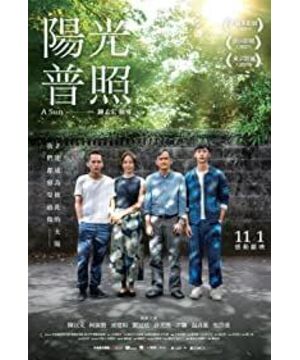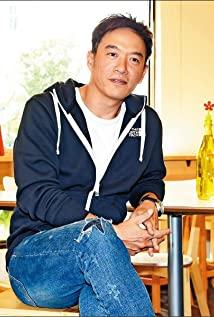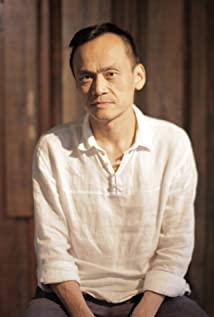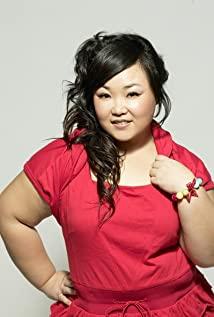"The Sunshine" tells the story of a family of four. The film contains issues of family affection, growth and reconciliation, with a distinct Taiwanese film style. The film focuses on the ordinary little people in Taiwanese society, creating a strong drama in the daily trivial family conflicts. Under the tranquility of life, every time the seemingly small characters have an undercurrent of emotion, which contains huge energy.
Distinctive and strong Taiwanese film style
Although director Zhong Menghong admits frankly, the only impact of the new Taiwanese film on him is to cause him to lose his job. But it is undeniable that Taiwanese films are influenced by Taiwan's geographical environment and unique cultural environment, and show some specific styles and temperaments. And these unique temperaments are highlighted in the wave of new Taiwanese films and are well known to everyone.
When watching this film, the distinctive Taiwanese film temperament has also become a feature that cannot be ignored in the film style. The lyrical and slow music shows everyone's humanistic atmosphere, the film color similar to the film color, and the dark green tone, all of which make people who are familiar with Taiwanese movies feel a little familiar. In addition, unique visual symbols such as mountain roads, motorcycles, and rainy roads are potential symbols of Taiwanese films. The imagery of rainy days and cheap plastic raincoats has been used and appeared many times in director Tsai Ming-liang's films. Afterwards, young Ah He and Cai Tou appeared, walked across the street room, and cut off the right hand of Hei Lun. The issue of youth crime and growth has always been an important theme of attention and narration in the films of Taiwanese directors such as Tsai Ming-liang after Yang Dechang and Taiwanese directors. .
Light and Darkness of Characters
In the film, Ah He and his friend Caitou belong to the marginalized group and are in the dark side of life and society. They fight, hang out in schools and streets, form gangs, bully and be bullied, and violence is the only way their community lives. Such teenagers, whether it is school, family or society, are on the fringes, living and dying according to their own laws, isolated from life outside the community. In the mainstream society they are violent, hateful, bad, backside, dark and shy. But no one cares about it, the shadows will always exist in the society, even if no one is watching, the marginal groups will always exist, there are always people entering, and some people are struggling to get out.
Contrary to Ah He's dark side, his brother Ah Hao is an almost perfect bright side. He has good grades, good looks, and a warm personality. Think about people everywhere. He never causes trouble in the family, and always helps his family solve problems rationally and sensible. As said in the film, he gives almost all the good to others. Such a pure person, but not transparent. Ah Hao's death became his real footnote.
The image of the mother is almost like the Virgin Mary, she is a little timid, but she influences everything with love. To deal with the pain of life, are tough and calm. Her husband's paranoia is in contrast to her. Facing the troubled boy's son, Xiaoyu, who came suddenly, she calmly accepts and loves unconditionally. The love of such women seems to be the cause of serious family problems, but in the end, it is precisely because of such unconditional love that reconciliation is finally reached.
The characters in the film all move from self to reconciliation. When his brother dies, Ah He moves from darkness to light. Although Ah Hao has passed away, he seems to have become Ah He's bright side and coexist with him. A father reconciles with his son, perceives others, and bears his blood for a son who has never admitted it before. Pure light and darkness have disappeared, leaving behind the shadow of the sun reconciling with the self.
naturalistic narrative
Taiwanese films started from director Hou Hsiao-hsien, including the use of long shots and the humanistic nature of the content, creating a soothing, natural, implicit and affectionate film temperament for Taiwanese films. In this movie, too. In a seemingly slow rhythm, he calmly talks about the various things facing the family.
The violence at the beginning of the film is shown naked, without any embellishment, let alone any beautification. Recorded in a realistic way.
After Ah He was imprisoned in the Shaofu Hospital, Xiaoyu's appearance, emotional breakdown in the room, and her mother's acceptance seemed to have no clues and logic to be found, and suddenly broke into the life of this family of four. Among them, Ah Hao's death is especially true. Except for the language of the camera, there is no foreshadowing of cause and effect. It is like a stone suddenly falling on the calm water and disappearing again. Surprise and weigh the audience. And such an arrangement further highlights the authenticity of the film's imitation of life, following a naturalistic approach in the narrative and respecting the great life itself.
In real life, accidents and disasters always come suddenly without hunch, and changes in others seem to be without warning.
As Lao Chen said, we didn't notice it at that time, even if we did notice... (It can't be changed)
drama and rupture
Under the naturalistic narrative, the story is not lacking in drama. From violence, juvenile delinquency, death, to gangsters, these stereotyped elements of the family are coerced into the lives of seemingly ordinary family members.
The front-end of the film lays out the narrative, from the death of Ah Hao, it began to take a sharp turn, and every step began to be gripping. Among them, the songs that everyone sang together when Ah He left the Junior Auxiliary Academy, the father and son's dream about his brother and other plots pushed the film to an emotional climax again and again.
Among them, the reappearance of Caitou aggravated the conflict. He used A He in various ways, the mood and plot of revenge, pulled A He into danger again and again, increased the uncertainty of A He's fate, and attracted people's feelings. heartstrings. Adding drama and viewing in the slow rhythm.
It is precisely because this film is mixed with violence, juvenile world, crime, death, gangster, growth and many other dramatic themes, from brother to Xiaoyu, to father to Caitou, everyone has a lot of information and content. The thinking points and the turning point of the father at the end are full of drama, from which we can see the originality of the director, but this also makes the overall film volume too large, which makes the movie viewing have a certain sense of rupture.
View more about A Sun reviews











